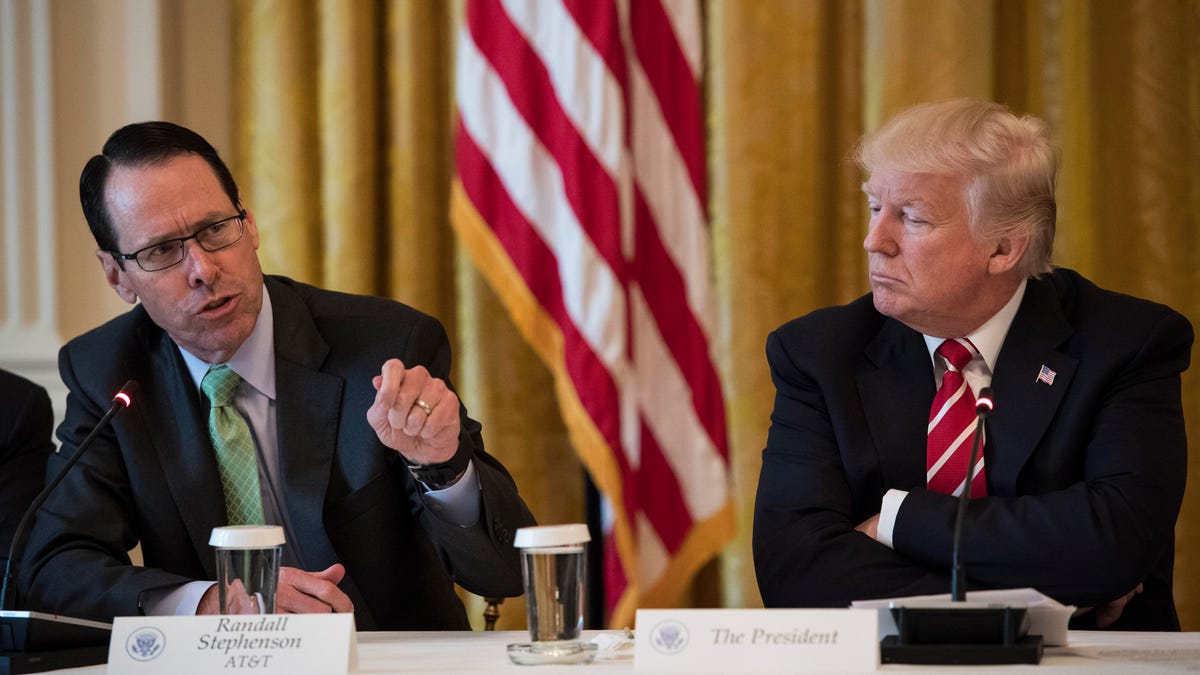AT&T loses bid for White House communications in antitrust case
AT&T won't get access to communications between the Justice Department and President Trump it claims influenced the decision to block its merger with Time Warner.

WASHINGTON, DC - JUNE 22: President Donald Trump listens to AT&T CEO Randall Stephenson during the "American Leadership in Emerging Technology" event in the East Room of the White House in Washington, DC on Thursday, June 22, 2017. (Photo by Jabin Botsford/The Washington Post via Getty Images)
AT&T was dealt a blow Tuesday in its defense of the Justice Department's lawsuit to block its purchase of Time Warner.
The judge overseeing the case rejected AT&T's request to access communications among the White House, the attorney general and the Justice Department's antitrust division regarding the deal.
AT&T requested the communications as part of its defense against a lawsuit aimed at blocking the $85 billion merger. The trial is expected to start in March. AT&T argues that the Justice Department has unfairly targeted the company because President Donald Trump doesn't like CNN, which is owned by Time Warner. As a candidate for president, Trump vowed to block the merger. And he has repeatedly called CNN "fake news."
But Judge Richard Leon said AT&T and Time Warner "have fallen short" in showing that the Justice Department has singled it out and its enforcement has been "selective."
"We respect the judge's decision and look forward to the upcoming trial," Dan Petrocelli, lead trial attorney for both Time Warner and AT&T, said in a statement.
At a hearing Friday, the Justice Department said politics played no role in its decision to block the merger. It said it has legitimate antitrust concerns the merger would harm consumers. AT&T has argued that the Justice Department has approved other similar mergers, including the Comcast-NBC Universal merger, which closed in 2011. AT&T says its merger would not result in higher prices for consumers and the deal is essential to keep AT&T competitive in an evolving market.
The ruling is a blow to AT&T's defense of the lawsuit. While the company can still try to argue at trial it's being unfairly targeted, it seems clear the judge may not be buying it. Instead, he seems to be siding with the Justice Department that there are legitimate antitrust concerns.
"As counsel for the government explained at length during [Friday's] hearing, history belies the notion that this action is the first and only time that the government has found an antitrust problem with a proposed vertical merger or insisted on a structural remedy as a condition to settlement," he wrote. "So while it may, indeed, be a rare breed of horse, it is not exactly a unicorn!"
The Justice Department has already given AT&T a log of communications between the White House and the antitrust division. AT&T was requesting the actual emails.
Consumer advocacy groups, like Public Knowledge, agree with the Justice Department that the merger would be bad for consumers.
"This ruling demonstrates that the court refuses to be distracted by politics and instead is focused on the facts and the law," Gene Kimmelman, president and CEO of Public Knowledge, said in a statement. "This is a great result for consumers worried about the danger of higher prices and harm to online competition likely to result from this merger."
Tech Enabled: CNET chronicles tech's role in providing new kinds of accessibility.
Batteries Not Included: The CNET team reminds us why tech is cool.

